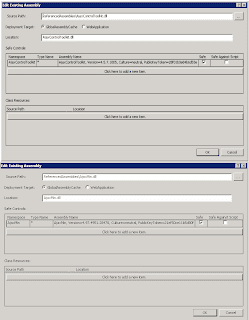CRM 2011 Plugin Template
Here is the template to get you started on plugin development in CRM 2011:
To get the service context of your organisation :
Important Notes:
PRE PLUGINS
POST PLUGINS
OTHERS
Hope this helps,
Andreas
To get the service context of your organisation :
Important Notes:
PRE PLUGINS
- You don't need to call SaveChanges because the entity can be updated before it is saved into database.
- For pre-update, entity will only have attributes that are changed. To get the other attributes that don't change, you can query those attributes using the service context.
POST PLUGINS
- You need to call SaveChanges because the entity has been saved into database.
- Entity will have all updated attributes when retrieved using service context.
- When doing the post update of an entity that update the same entity attributes, loop will occur. To avoid this you can use context.Depth to check the loop count.
OTHERS
- For delete message, the context.InputParameters["Target"] is an EntityReference instead of Entity.
- You can check the context message using context.MessageName
Hope this helps,
Andreas

Comments
Post a Comment